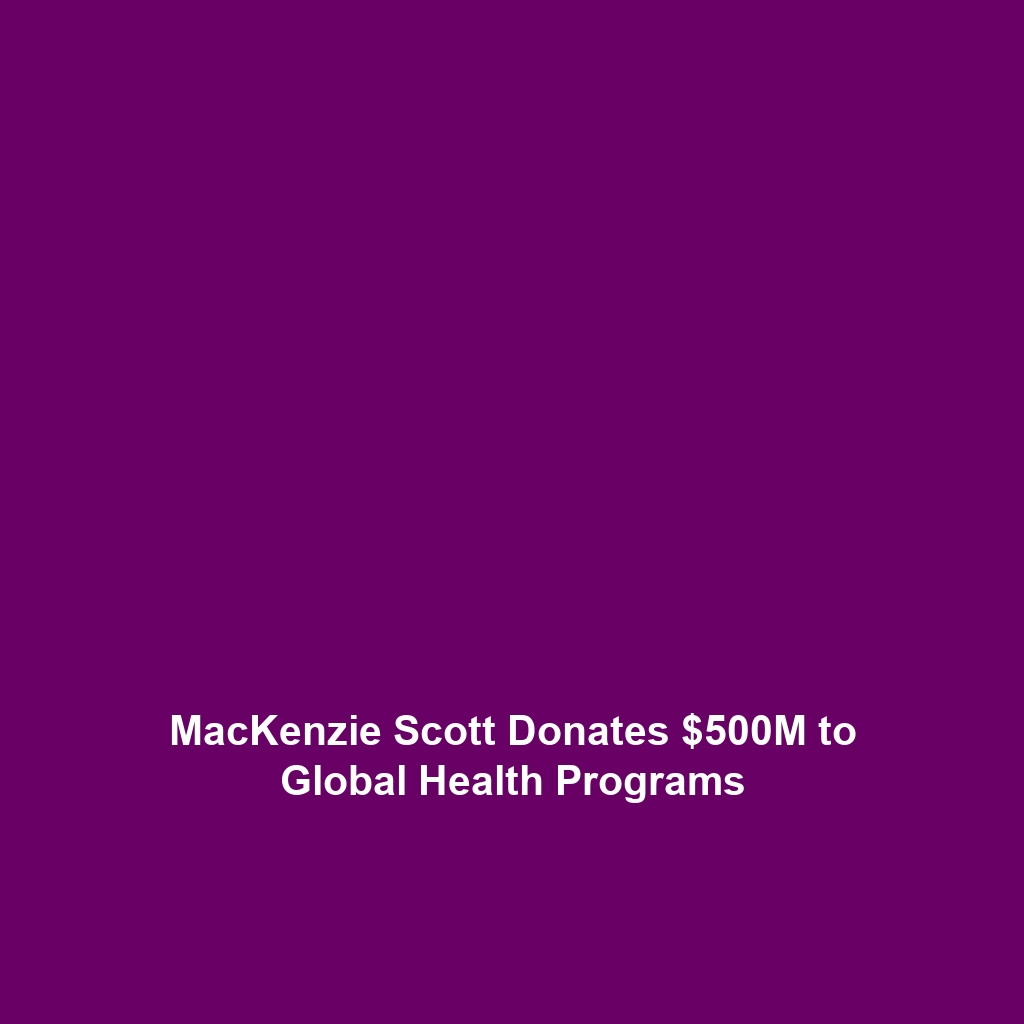Your cart is currently empty!
Tag: global health systems

MacKenzie Scott Donates $500M to Global Health Programs
<>
MacKenzie Scott Donates $500M to Global Health Programs
MacKenzie Scott Donates $500M to Global Health Programs
In a landmark philanthropic move, MacKenzie Scott, the ex-wife of Amazon founder Jeff Bezos, has pledged $500 million to global health initiatives aimed at combating malnutrition and preventable diseases. This significant contribution underscores Scott’s commitment to supporting health programs that address pressing global health challenges.
Targeting Malnutrition and Preventable Diseases
Scott’s $500 million donation will support a range of organizations and initiatives that focus on alleviating malnutrition and preventing diseases that disproportionately affect vulnerable populations. The funds will be distributed amongst various non-profit organizations working in areas such as food security, maternal and child health, and infectious disease prevention.
According to the World Health Organization (WHO), nearly 690 million people are undernourished globally, a number that has been exacerbated by the COVID-19 pandemic. Scott’s donation aims to not only address the immediate effects of malnutrition but also tackle the broader systemic issues that contribute to it.
The Importance of Philanthropic Support
Philanthropic contributions are critical in the fight against public health crises, particularly in low-income countries where funding is limited. Experts argue that private donations like Scott’s can be pivotal for programs that might not receive priority in government budgets.
Dr. Sarah Thompson, a public health professor at Johns Hopkins University, remarked, “Scott’s donation comes at a crucial time when global health systems are still recovering from the impacts of the pandemic. It sends a strong message that investing in health equity is a global priority.”
Scott’s Philanthropic Journey
Since her divorce from Bezos in 2019, Scott has emerged as one of the most prominent philanthropists in the world. Her giving approach is characterized by a commitment to providing unrestricted funds to organizations rather than directing donations toward specific projects. This trust-based model enables organizations to allocate resources where they are most needed.
Scott has previously donated billions to various causes, including education, racial equity, and economic mobility, underscoring her focus on systemic change. Her latest donation reflects her ongoing dedication to improving health outcomes globally.
Potential Impact of the Donation
The $500 million donation is expected to significantly enhance the capabilities of organizations like Partners in Health and the Global Fund, which are crucial in delivering health services and resources to underserved communities. The contribution can help fund innovative health interventions and further research on health disparities.
The Global Fund, which focuses on combating AIDS, tuberculosis, and malaria, expressed gratitude for the donation, highlighting that the funds will help ensure health equity and access for marginalized populations. “With this level of financial commitment, we can scale our efforts and reach more communities in need,” stated Dr. Mark Dybul, a former executive director of the Global Fund.
Challenges Ahead
Despite the positive reception of Scott’s donation, significant challenges remain in the global health landscape. Malnutrition and preventable diseases are deeply intertwined with factors such as poverty, education, and access to healthcare. Simply injecting funds into these issues may not be sufficient without concurrent efforts to address these underlying factors.
Health experts stress that collaborative approaches, involving governments, NGOs, and the private sector, are essential to create sustainable change. For Scott’s donation to have lasting impact, it may need to be part of a broader strategic initiative that includes policy reforms and grassroots engagement.
Future of Philanthropy
Scott’s donation aligns with a broader trend in philanthropy that emphasizes the need for urgent action around health equity. As more individuals of wealth commit to the cause, there is potential for transformative impact on global health systems.
This shift is particularly relevant as the world continues to confront the long-term consequences of the COVID-19 pandemic, which has disproportionately affected vulnerable populations. Philanthropy will play a critical role in mobilizing resources to mitigate these impacts and support recovery efforts.
In conclusion, MacKenzie Scott’s $500 million donation offers hope for global health programs addressing malnutrition and preventable diseases. As organizations work to implement these funds effectively, the emphasis will be on creating sustainable solutions that extend beyond immediate relief efforts. With continued commitment from major philanthropists, there is potential for significant advancements in global health equity.